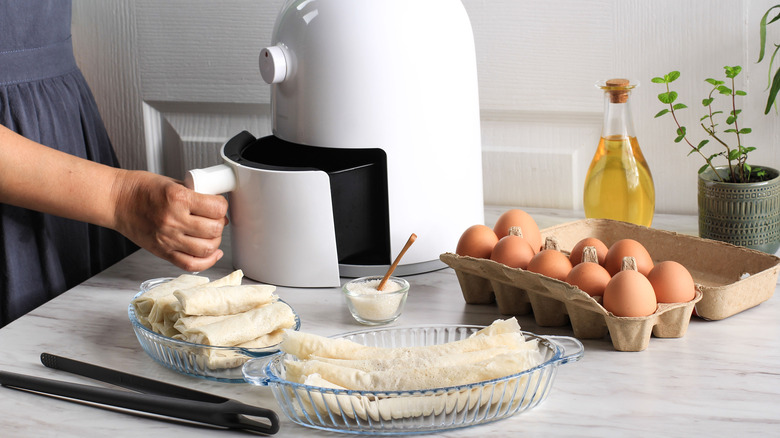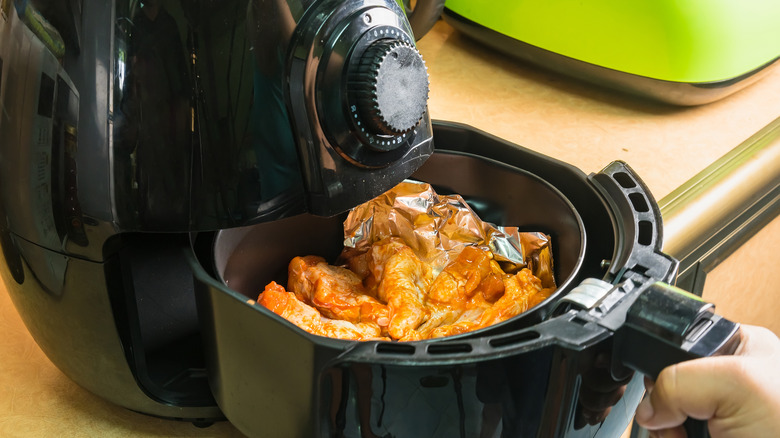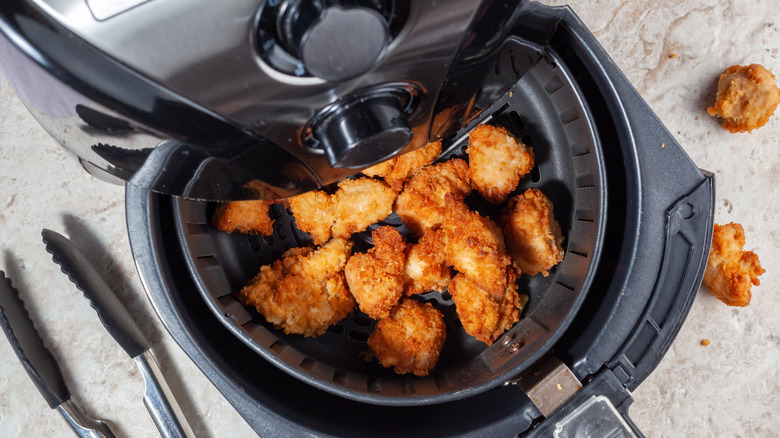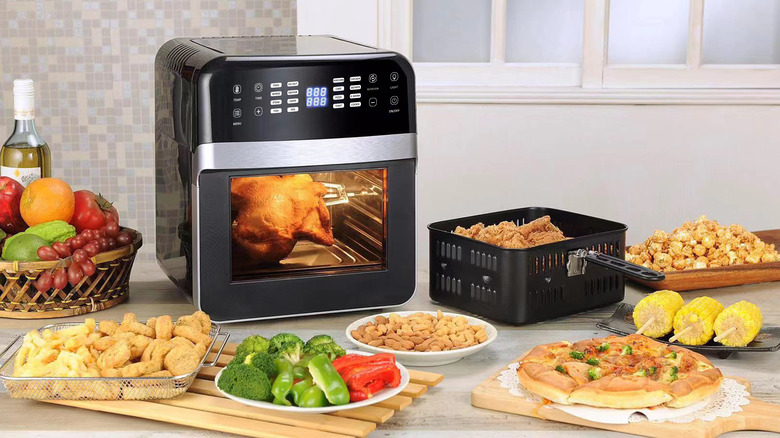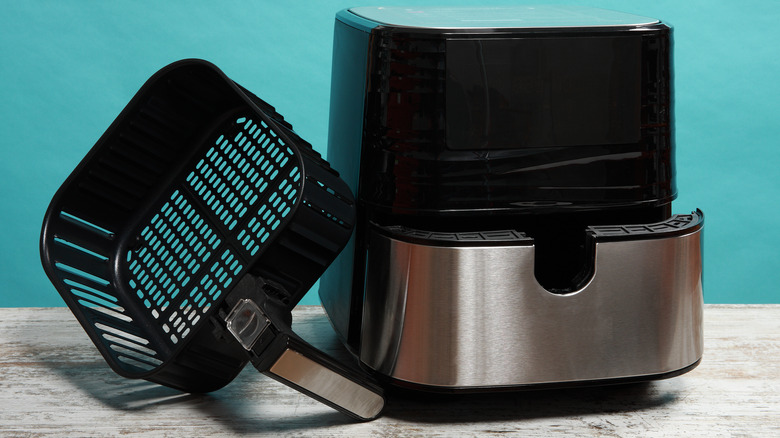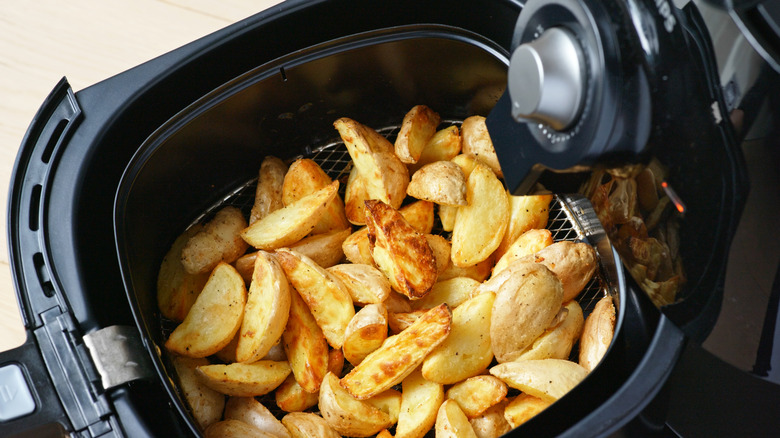So You Got An Air Fryer. Now What?
In a world that seems to be growing increasingly fast-paced, you want the prep time of your snacks and meals to be just as fast. Who wants to wait for your oven to heat up, both itself and your home, for some mozzarella sticks you're not even hungry for anymore? And the idea of living off frozen dinners can make you want to eat the plastic they came in. You want food that tastes fresh out of the oven, has a satisfying crispiness to it, and can be made in under half the time of the old hotbox oven. After some debate, you decide to splurge on an air fryer, joining the 37% of people in the United States who had purchased the device as of July 2020 (via NPD).
But, being the smart consumer you are, you have some questions before you take it out the box: How does it work? How can I maintain it? What are some things I should and shouldn't use it for? Fortunately, the air fryer is a simple machine and soon enough, you'll be air-frying your favorite meals like a pro.
The first air fryer
Philips first debuted their popular air fryer at Berlin's IFA in 2010 (via Air Fryer Daily). But the history behind this oil-free deep fryer extends farther back. Several decades ago, ahead of the invention of the microwave oven in 1945, the Maxson Whirlwind Oven was created by industrialist William. L. Maxson, a steadfast believer in the idea of freezing and reheating foods (via New Air). The unit was made of aluminum and steel, weighed 35 pounds, and used a 120 volt DC motor to heat the food. And while some air fryers of today are quite compact, Maxson's device could hold six meals at a time — and cook them in about 15 minutes.
After Maxson's death in July 1947, his children had no interest in taking on the family business and his company shut down. Although other companies had some success with their own versions of the air fryer, it was Philips' air fryer that re-ignited Maxson's vision of quick and delicious reheated meals.
What separates an air fryer from an oven?
The first question you probably have is about the difference between an air fryer and an oven. After all, you don't want to spend money on something that's nothing more than a smaller version of something you already have. Well, the heating method in the air fryer is similar to that of a convection oven in that it uses dry heat to cook food (via PureWow).
Unlike your regular oven though, the air fryer's small, compact size allows for its key benefits to shine through. Thanks to the small size of the fryer, the cooking area for your food is much smaller, which allows all that hot air to better circulate around your food. The perforated, fryer-style basket you place inside the fryer itself also helps to ensure a far less greasy end product, as the breathable container allows for better transfer of heat and the collection of dripping oils, per BlueJeanChef.
How can I get the most out of my air fryer?
The air fryer is renowned for its versatility. From frozen chicken nuggets to bacon, your new air fryer can help prepare foods quickly and easily — in under half the time of your oven. Of course, with such a powerful countertop gadget, you'll want to get the most bang for your buck, right? In an article from Insider, one of the biggest mistakes people have when using in an air fryer is that they're using it only as a miniature deep fryer, completely tossing aside the fact it's a smaller convection oven. Kenzie Swanhart, culinary director at Ninja, suggests using your air fryer to cook chicken breasts, pork chops, and cook small roasts, or to reheat leftovers. Meanwhile, Byron Puck, chef at Wolfgang Puck Fine Dining Group, recommended using the device to bake desserts, including doughnuts and cakes.
With all these things you can make in an air fryer, there are also foods you should steer clear of. It's recommended that you avoid anything that has a wet tempura batter, such as corndogs or shrimp, as it will make the batter sticky and gummy, and broccoli, as it will dry out in the intense heat. In addition, one should also stay away from over-seasoned meats, which will also leave a mess behind (via Insider).
How do I maintain my air fryer?
Much like your computer or car, your air fryer will become an important tool in your daily life. So, just as you would for your other devices, you should do your best to keep up with its maintenance. Although the air fryer is much cleaner than a normal deep fryer, oils and grease from your food can build up in its basket. And, if you let them linger too long, they'll start to burn up on the heating element, which can lead to foul smells and smoke damage.
Larry Cuifo, of Consumer Reports, offered a few simple steps to clean your air fryer and avoid damage caused by unseen build-up. First off, he suggested cleaning the air fryer as much as you can in order to eliminate any chance of waste build-up. Letting the air fryer cool down and then running the food basket and drawer with soft cloth (no abrasives) and warm soapy water will remove most of the greasy leftovers. After cleaning the interior with a soft, sudsy cloth and wiping down the exterior for good measure, all that's left is letting the air fryer dry off.
Is my air fryer healthier than my oven?
As you sit reading this, waiting for your jalapeño poppers to heat up in the air fryer, you may have heard the suggestion that air fryers are healthier than a deep fryer or normal oven. And, while this isn't exactly false, it's not exactly true either. It's sort of a cross between fact and fiction.
True, air fryers don't require all the oils and lards that would usually be required for conventional deep-frying. According to Medical News Today, using air fryers to fry one's food helps to prevent the build-up of toxic acrylamide (a compound believed to have links to certain cancers) and can theoretically contribute to weight loss thanks to the removal of unhealthy oils and fats during cooking.
However, the outlet continues, there are still certain health issues when using an air fryer. The chicken strips and fries you're making still aren't exactly the healthiest foods for you, even if they aren't cooked in oil. And while acrylamide isn't as prominent in air frying, other harmful compounds, such as polycyclic aromatic hydrocarbons and heterocyclic amines, could still form.
